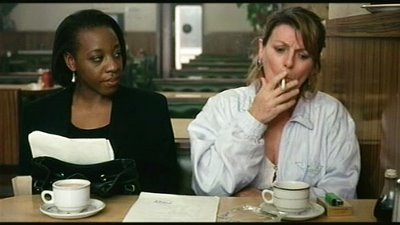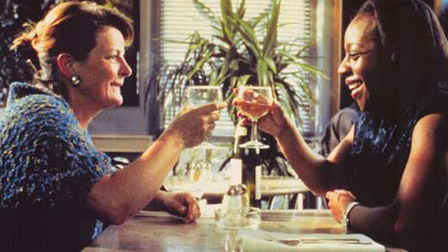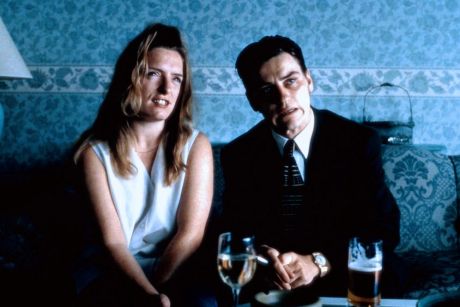From the Chicago Reader (October 25, 1996). In a recent and rather interesting book about Mike Leigh published by the University of Illinois Press, Sean O’Sullivan takes exception to this review (among others), with intriguing results. — J.R.
Secrets and Lies
Rating *** A must see
Directed and written by Mike Leigh
With Brenda Blethyn, Timothy Spall, Marianne Jean-Baptiste, Phyllis Logan, Elisabeth Berrington, Lee Ross, Claire Rushbrook, Ron Cook, Michele Austin, and Lesley Manville.
I’ve seen Secrets and Lies three times since it premiered at Cannes in May, and each time the movie’s apparent rough patches have seemed smoother — clear evidence that writer-director Mike Leigh knows exactly what he’s doing and why. But whether his knowledge and a viewer’s recognition of it make this comedy-drama a masterpiece is another matter. Some of my hipper colleagues feel a little suspicious about the film’s mainstream pitch, wondering whether the whole thing finally goes down a bit too easily, given Brenda Blethyn’s quavering histrionics, the upbeat conclusion, the snugness of the whole concept. But I can hardly begrudge a filmmaker as talented as Leigh a way of conveying his gifts to a wider audience; after all, Secrets and Lies doesn’t represent the same sort of coarsening of a filmmaker’s vision as Jane Campion’s The Piano, coming after Sweetie.
Nevertheless there has been a discernible change in Leigh’s work since his last dysfunctional-family opus, Life Is Sweet — a change well described by Australian critic Adrian Martin in a recent letter to me: “I think that as a certain angry anti-Thatcher 80s politics has drained from Leigh’s work, he has gravitated to either the bombastic nihilism of Naked (a film I have incredibly mixed feelings about) or the soft-heartedness of Secrets and Lies.” Put somewhat differently, the political anger that first gave way to metaphysical hopelessness in Naked has now been transmuted into a more standard drama about repression and self-deception. These are problems curable by personal means alone, without reference to a wider political context or much recourse to the sort of multilayered psychological ambiguity found in the work of Maurice Pialat or John Cassavetes.
In the final analysis, what one thinks of Secrets and Lies depends on the films one compares it to. Set alongside most recent Hollywood pictures it looks like a masterpiece, but considered in relation to the best of Leigh — say, Meantime or Grown-ups or High Hopes – or the best of recent non-Hollywood films, it looks rather thin. The characters lack complexity, and though Secrets and Lies has the sort of actorly assurance one associates with a good night at the English theater, it’s not the kind of show that sticks to one’s ribs.
The film’s drama depends on two narrative strands that eventually converge. In the first strand, Hortense (Marianne Jean-Baptiste), a young, black optometrist, decides after the death of her adoptive mother to track down her birth mother, who gave her up in infancy, and is astonished to discover that she’s white. The second strand concerns her mother, a middle-aged factory worker named Cynthia (Brenda Blethyn) who lives in London with another illegitimate daughter, Roxanne (Claire Rushbrook), a street sweeper who despises her mother and won’t even introduce her to her scaffolder boyfriend (Lee Ross). Cynthia has a kid brother Maurice, a successful portrait photographer (Timothy Spall), whom she adores but hasn’t seen in ages because of smoldering resentments between her and her snobbish sister-in-law Monica (Phyllis Logan).
Monica proposes to Maurice that they throw a 21st birthday party for Roxanne; shortly after that Hortense phones Cynthia, who initially refuses to speak to her, then reluctantly agrees to meet her outside Holborn tube station. After a traumatic first encounter — when Cynthia’s denial that Hortense is her daughter neatly matches the viewer’s difficulty with the same premise — Cynthia and Hortense develop a warm rapport and start spending time together. At the climactic birthday party, Cynthia arrives with Hortense, whom she introduces as a friend from work, and eventually the “secrets and lies” — about Hortense’s true identity and about Maurice and Monica’s marriage — spill out.
It’s indicative of the film’s limitations that we never learn precisely why Hortense looks for her birth mother in the first place. Though some character traits are eventually accounted for, however simplistically — such as Roxanne’s hatred for her mother and Monica’s general unhappiness — other details have to be accepted on faith. The notion of buried family secrets eventually screaming to the surface recalls Ibsen, and it’s one of the paradoxes of Leigh’s reputation as an innovator that all his dramatic ideas turn out to be fairly traditional. The facts that Maurice’s job consists partly of telling his subjects how to pose and that Hortense’s determines how well people see represent only one theme among many suggesting a structure direct from Playwrighting 101.
Moreover, Leigh’s method of generating characters and plots — doing lengthy individual preparations with the actors on their characters before writing the script — grows directly out of theatrical techniques established by Konstantin Stanislavsky near the beginning of this century. There’s certainly nothing wrong with adapting such techniques for his own purposes and reasserting their validity, but to label Leigh as a trailblazer overlooks the fact that he uses standard techniques to arrive at some fairly well-established “discoveries.” Indeed, Leigh’s own capsule description of his film, published in the Cannes film festival catalog, sounds like the sort of thing Jack Valenti might have come up with for an after-dinner speech: “Secrets and Lies is about roots and identity, the ever-changing images we all have of ourselves and each other, and our compulsive need to reaffirm constantly who and what we are, and where we come from. It is also a tale of love and caring and deep longings and of the awesome relentlessness of the passage of time.” All of which is certainly true but could apply equally well to Gone With the Wind.
So much for caveats. Why, then, have I liked Secrets and Lies so much that I’ve been able to see it three times with pleasure, and found it as gripping the third time as the first? Certainly the actors have a great deal to do with this, not to mention Leigh’s virtuosity in knowing precisely how to place them and when to let them rattle on without cuts or nudging close-ups. Blethyn — who won the best actress prize at Cannes and did an equally admirable job in Grown-ups — is impressive less for the individual notations she gives Cynthia than for her full-bodied rendition of a not-very-bright life force. (In some ways, her character is an impressive fleshing out of the flamboyant mother figures in Woody Allen’s Interiors and September, played respectively by Maureen Stapleton and Elaine Stritch, given additional poignancy by Cynthia’s working-class drudgery and low self-esteem.) Spall, who played the very different part of the restaurant owner in Life Is Sweet, magisterially conveys a sense of goodness, and Jean-Baptiste in a much less showy part pulls off a rare feat in a Mike Leigh film: she escapes the writer-director’s usual caricatural scorn for the middle class. Less lucky is Logan, whose Monica seems hemmed in by Leigh’s customary class bias — even though this allows for a hilarious house tour during the birthday party, the sort of class satire that’s a Leigh specialty. (The lowering of each toilet lid during this sequence resounds like a musical refrain.)
Most of the time Jean-Baptiste’s acting seems constrained by the fact that the plot requires Hortense to reveal only limited portions of herself, but fortunately Leigh gives her one early scene with a friend in more familiar surroundings that allows her to open up. Another seemingly unnecessary scene that’s one of my favorites involves the unexpected reappearance of the man who used to run Maurice’s photography studio, a burnt-out case racked with private grief (Ron Cook). Like the scenes of Maurice’s photo sessions, this character suggests other lives and destinies — trajectories leading away from the central narrative — that allow a bit of air into what would otherwise be a claustrophobic chamber piece. (It’s been rumored that some of these photo sessions, notably one involving a woman disfigured in an auto accident, represent subplots Leigh eliminated when the story started getting too long and unwieldy; another photo session features Alison Steadman, Leigh’s recently divorced wife of many years, who starred in many of his previous pictures.)
I also like the film for its relative largesse to a dysfunctional family struggling for mutual acceptance. Cynthia is a mess, barreling her way through the story, but it’s her messiness that ultimately exposes the family wounds and therefore allows them to begin to heal. If Roxanne, with her perpetual expression of pinched distaste, registers at times like a too-easy replay of the bulimic daughter in Life Is Sweet, at least Leigh is thoughtful enough to provide her with a boyfriend and an uncle who persuade her to grow beyond her mother’s fatalistic projections and self-image. Even Monica is allowed to redeem herself somewhat in her final scene.
The film’s feel-good conclusion suggests that, appearances to the contrary, it’s possible to reconstruct one’s past as well as one’s future — and to rediscover one’s identity in the present. Even if Leigh and his characters seem to arrive at this discovery a bit too quickly and easily, I still prefer this willful sunniness to the facile and premature fatalism of Naked. Both films represent philosophical shortcuts, but at least Secrets and Lies takes you somewhere, and it’s a trip worth taking.
Published on 24 Aug 2011 in Featured Texts, Featured Texts, by jrosenbaum








